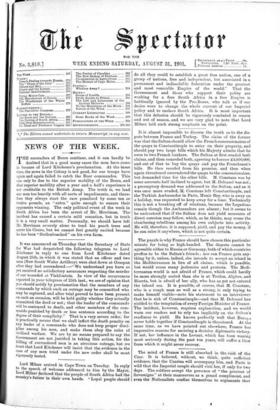The puzzle is why France should have chosen this particular
minute for being so high-handed. The dispute cannot be agreeable either to Russia or Germany, both of which countries proftss to be the Sultan's friends ; nor can France gain any- thing by it, unless, indeed, she intends to accept an island in the Mediterranean in lieu of all claims, which is possible, but would rouse many jealousies and protests. The Medi- terranean world is not afraid of France, which could hardly be more strongly seated than she is at Toulon, Algiers, and Biserta, but is afraid of her ally, who has as yet not entered the inland sea. It is possible, of course, that M. Constans, who is a rough man as well as a strong, is only trying to make himself visible—note his statement to an interviewer that he is sick of Constantinople—and that M. Delcasse has yielded to the temptation of every Foreign Minister of France. The incident, however, requires explanation, and we would warn our readers not to rely too implicitly on the Sultan's readiness to yield. He knows perfectly well that Europo never holds together if Constantinople is threatened. At the same time, as we have pointed out elsewhere, France has imperative reasons for securing s. decisive diplomatic victory. If not, her influence in the Levant, which has been waning most seriously during the past ten years, will suffer a blow from which it might never recover.


































